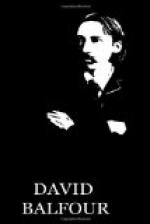I had borne a good deal pretty patiently, but this was over the mark.
“You have no right to speak to me like that,” said I. “What have I done but to be good to you, or try to? And here is my repayment! O, it is too much.”
She kept looking at me with a hateful smile. “Coward!” said she.
“The word in your throat and in your father’s!” I cried. “I have dared him this day already in your interest. I will dare him again, the nasty pole-cat; little I care which of us should fall! Come,” said I, “back to the house with us; let us be done with it, let me be done with the whole Hieland crew of you! You will see what you think when I am dead.”
She shook her head at me with that same smile I could have struck her for.
“O, smile away!” I cried. “I have seen your bonny father smile on the wrong side this day. Not that I mean he was afraid, of course,” I added hastily, “but he preferred the other way of it.”
“What is this?” she asked.
“When I offered to draw with him,” said I.
“You offered to draw upon James More?” she cried.
“And I did so,” said I, “and found him backward enough, or how would we be here?”
“There is a meaning upon this,” said she. “What is it you are meaning?”
“He was to make you take me,” I replied, “and I would not have it. I said you should be free, and I must speak with you alone; little I supposed it would be such a speaking! ‘And what if I refuse?’ says he.—’Then it must come to the throat cutting,’ says I, ’for I will no more have a husband forced on that young lady than what I would have a wife forced upon myself.’ These were my words, they were a friend’s words; bonnily have I been paid for them! Now you have refused me of your own clear free will, and there lives no father in the Highlands, or out of them, that can force on this marriage. I will see that your wishes are respected; I will make the same my business, as I have all through. But I think you might have that decency as to affect some gratitude. ’Deed, and I thought you knew me better! I have not behaved quite well to you, but that was weakness. And to think me a coward and such a coward as that—O, my lass, there was a stab for the last of it!”
“Davie, how would I guess?” she cried. “O, this is a dreadful business! Me and mine,”—she gave a kind of wretched cry at the word—“me and mine are not fit to speak to you. O, I could be kneeling down to you in the street, I could be kissing your hands for your forgiveness!”
“I will keep the kisses I have got from you already,” cried I. “I will keep the ones I wanted and that were something worth; I will not be kissed in penitence.”
“What can you be thinking of this miserable girl?” says she.
“What I am trying to tell you all this while!” said I, “that you had best leave me alone, whom you can make no more unhappy if you tried, and turn your attention to James More, your father, with whom you are like to have a queer pirn to wind.”




